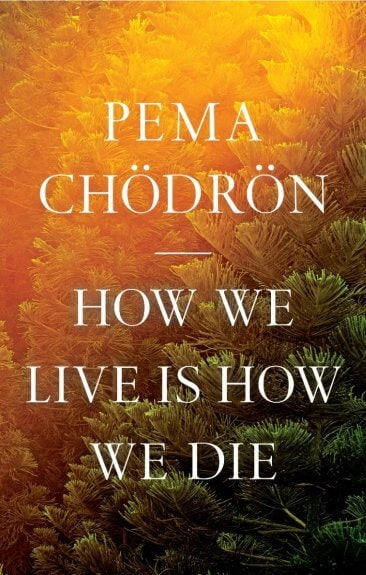How We Live Is How We Die
How We Live Is How We Die
by Pema Chödrön
Couldn't load pickup availability
Share

About the Book
Discover newfound freedom in life’s ever-constant flow of endings and beginnings with the wise words of Pema Chödrön, beloved Buddhist nun and bestselling author of When Things Fall Apart
As much as we might try to resist, endings happen in every moment—the end of a breath, the end of a day, the end of a relationship, and ultimately the end of life. And accompanying each ending is a beginning, though it may be unclear what the beginning holds. In How We Live Is How We Die, Pema Chödrön shares her wisdom for working with this flow of life—learning to live with ease, joy, and compassion through uncertainty, embracing new beginnings, and ultimately preparing for death with curiosity and openness rather than fear.
Poignant for readers of all ages, her teachings on the bardos—a Tibetan term referring to a state of transition, including what happens between this life and the next—reveal their power and relevance at each moment of our lives. She also offers practical methods for transforming life’s most challenging emotions about change and uncertainty into a path of awakening and love. As she teaches, the more freedom we can find in our hearts and minds as we live this life, the more fearlessly we’ll be able to confront death and what lies beyond. In all, Pema provides readers with a master course in living life fully and compassionately in the shadow of death and change.
About the Author
Ani Pema Chödrön was born Deirdre Blomfield-Brown in 1936, in New York City. She graduated from the University of California at Berkeley and was an elementary school teacher for many years in New Mexico and California.
In her mid-thirties, Ani Pema met and studied with
Lama Chime Rinpoche, becoming a novice nun in 1974 in London. She received ordination from His Holiness the Sixteenth Karmapa during that time.
Pema first met her root guru, the teacher with whom she had the most profound connection, Chögyam Trungpa Rinpoche, in 1972, and she studied closely with him until his death in 1987.
In 1984, at the behest of Chögyam Trungpa Rinpoche, Ani Pema moved from Boulder, Colorado to Cape Breton, Nova Scotia to be the director of Gampo Abbey. She currently teaches throughout the United States and Canada and continues her studies and meditative retreat under the guidance of Venerable Dzigar Kongtrul Rinpoche.
The nonprofit Pema Chödrön Foundation was established to further Ani Pema’s interest in helping establish Tibetan Buddhist monasticism in the West as well as to support the continuation of her teachings across traditions.
Editorial Reviews
"Chödrön’s clarity and warmth make this book accessible to a wide array of audiences. . . . Oft-quoted, much beloved, and radiating kindness, Chödrön remains a guiding light for those seeking spiritual growth." —Library Journal
"In this sage treatise, Buddhist nun Chödrön muses philosophically on life transitions. . . . This wise volume shines." —Publishers Weekly
"Instructive, compassionate, and welcoming, How We Live Is How We Die works to ease fearful attitudes toward death and improve people’s daily lives through spiritual renewal and release." —Foreword Reviews
"A means of transmitting the wisdom and light of [the Bardo Tödrol] into the modern world. In a time when people would most like to dwell in the illusion of certainty, Chödrön reminds readers to recognize beauty in unpredictability and to relinquish their grip on a reality that is, and will always be, in flux." —Shelf Awareness
"Chödrön beautifully shows in this new book how to transform what happens to us and in us—even the painful episodes—into forms of awakening." —Spirituality & Practice
"This is a profound and most necessary text on how we awaken to our own dying. When we learn to address our death and live into the consciousness surrounding it, we deepen and greatly improve the quality of our living. A meditation, a provocation, an invitation." —V (formerly Eve Ensler), Tony Award-winning playwright and author of The Vagina Monologues

